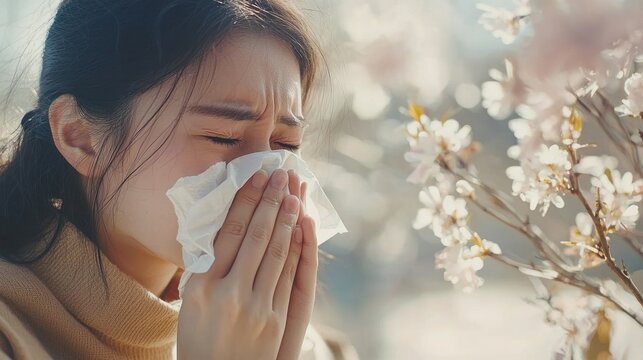As the days get longer and the flowers start to bloom, spring brings with it a refreshing change in the air. However, for many, this vibrant season also means the return of dreaded spring allergies. Whether it’s pollen, mold, or even dust, allergens are at their peak during the spring months, and they can make life miserable for those who suffer from hay fever or allergic rhinitis.
If you’re one of the millions dealing with sneezing, itchy eyes, runny noses, and congestion, don’t worry! There are plenty of ways to cope with spring allergies and still enjoy all the beauty this season has to offer. Here are some effective tips to manage your symptoms and make it through allergy season with ease.
1. Know Your Triggers
Understanding what specifically triggers your allergies is the first step toward managing them. The main culprits in the spring are:
- Tree pollen (oak, birch, cedar)
- Grass pollen (timothy, ryegrass)
- Mold spores (from damp areas, fallen leaves)
- Dust mites (stirred up by warmer weather)
Keep track of when symptoms are most severe and which allergens seem to bother you the most. Local weather reports and pollen forecasts can help you stay ahead of the curve.
2. Keep Windows Closed
When pollen levels are high, it’s important to keep windows and doors closed, both at home and in your car. This can help prevent allergens from entering your living space. Use air conditioning instead to help cool down your home while keeping allergens out. Also, if you’re planning to spend time outside, make sure to wear sunglasses to protect your eyes from pollen.
3. Limit Time Outdoors
While spring’s sunny days are inviting, try to stay indoors when pollen counts are at their highest (typically early morning and late afternoon). If you need to go outside, try to wear a mask to reduce exposure. Afterward, be sure to shower and wash your hair to remove pollen from your skin and hair. Change your clothes as well to avoid tracking pollen inside.
4. Use HEPA Air Filters
Investing in HEPA air filters for your home can make a huge difference. These filters trap tiny particles like pollen, mold spores, and dust mites, keeping your indoor air cleaner. Place them in rooms where you spend the most time, such as your bedroom or living room. A HEPA vacuum cleaner can also help reduce allergens from carpets and upholstery.
5. Allergy Medications: Know Your Options
Over-the-counter allergy medications can provide significant relief from symptoms. Some popular options include:
- Antihistamines (e.g., loratadine, cetirizine): These help block the histamine response that causes allergy symptoms like sneezing and itching.
- Decongestants (e.g., pseudoephedrine): These can reduce nasal congestion.
- Nasal corticosteroids (e.g., fluticasone): These reduce inflammation in your nasal passages, making it easier to breathe.
- Eye drops (e.g., ketotifen): These can help relieve itchy, watery eyes.
Talk to your doctor to determine which medication is best for your specific symptoms and needs.
6. Rinse Your Nasal Passages
A saline nasal rinse can help clear pollen and mucus from your nasal passages, offering relief from congestion. You can use a neti pot, saline sprays, or a nasal irrigation system. Just be sure to use distilled or sterile water to avoid any potential infections.
7. Stay Hydrated
Drinking plenty of water throughout the day helps keep your mucous membranes moist and can thin the mucus in your nasal passages, making it easier to clear out allergens. Staying hydrated can also prevent your throat from feeling dry or scratchy, another common allergy symptom.
8. Create an Allergy-Free Zone
Make your bedroom a sanctuary from allergens. Consider replacing carpets with hardwood or tile floors, as they trap fewer allergens. Wash bedding in hot water weekly to eliminate pollen and dust mites. You might also want to invest in allergy-proof covers for your pillows and mattress, which can prevent dust mites from accumulating.
9. Consider Natural Remedies
Some people find relief from natural remedies like:
- Local honey: It’s believed that consuming small amounts of local honey can help build up tolerance to local pollen. While this remedy is anecdotal, many people swear by its benefits.
- Essential oils: Oils like peppermint or eucalyptus can help clear nasal congestion and reduce inflammation.
- Herbal teas: Peppermint, chamomile, and ginger teas are known to have anti-inflammatory properties that may provide relief from allergy symptoms.
Before trying any natural remedies, it’s important to consult with your healthcare provider to ensure they won’t interact with other medications you may be taking.
10. Consult an Allergist
If your allergies are severe and impacting your quality of life, it may be worth visiting an allergist. An allergist can help you identify specific allergens and might recommend treatments like allergy shots (immunotherapy), which can help desensitize your body to certain allergens over time.
Final Thoughts
Spring allergies are a nuisance, but with the right precautions, treatments, and lifestyle adjustments, you don’t have to let them ruin your enjoyment of the season. By taking steps to limit exposure to allergens, managing your symptoms with the right medications, and maintaining a clean living environment, you can breathe easier and enjoy all the beauty that comes with spring.
Stay prepared, and remember that allergy season is temporary. Soon enough, the pollen will subside, and you’ll be able to enjoy clear skies and warm sunshine without the sneezing fits. Take care of your health, and here’s to a less sneezy spring!





